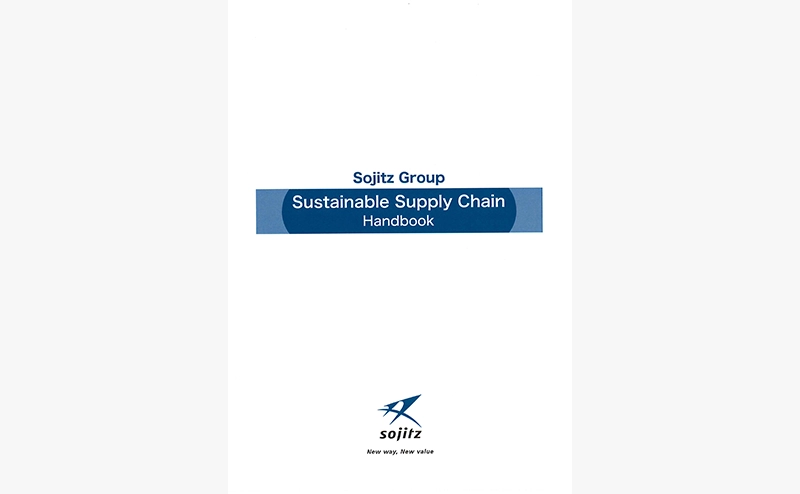Sojitz Group CSR Action Guidelines for Supply Chains
As a general trading company developing business around the world, Sojitz is involved in a wide range of supply chains. This means that one of the biggest challenges for Sojitz Group is figuring out how to work together with suppliers to reduce environmental and social (human rights) risk within our supply chains.
Sojitz has established the Sojitz Group CSR Action Guidelines for Supply Chains based on the ten principles of the United Nations Global Compact. We share these guidelines with our suppliers and require them to develop climate change countermeasures; initiatives for effective use of water, waste materials, and other resources; measures to protect biodiversity; and responses to human rights violations. In practice, we will respect the requirements of international standards such as the "Due Diligence Guidance for Responsible Supply Chains of Minerals from Conflict-Affected and High-Risk Areas" stipulated by the OECD.
Sojitz Group CSR Action Guidelines for Supply Chains
Sojitz Group’s business activities are underpinned by collaboration with business partners in diverse countries and regions as well as within various industries. Sojitz Group strives to promote CSR initiatives in the supply chain as we conduct our business in this diverse context.
Our Expectations: In order to conduct responsible business, incorporating respect for the human rights of stakeholders and protection of the environment, Sojitz Group requires suppliers to understand implement the following items as it strives, with them, to do business in harmony with society and the environment.
- Respect for the human rights of employees, and treatment of employees in a humane manner.
- Prevention of forced labor, child labor, and the observance of appropriate labor hours and minimum wage.
- Non-discrimination in hiring and employment.
- Respect for employees’ freedom of association and the right to collective bargaining to ensure constructive negotiations between labor and management.
- Provision of a safe, sanitary and healthy work environment for employees.
- Observance of all relevant laws and regulations, ensuring fair transactions and prevention of corruption.
- Ensuring the quality and safety of products and services.
- Consideration for ecosystems, the environment, and environmental conservation within our business activities, as well as efforts to prevent environmental pollution.
- Timely and appropriate disclosure of information regarding the above items.
<Cases of Material Breach>
In the event of a material breach of the Action Guidelines, Sojitz Group shall, upon verifying the facts, request that the supplier or other business partner improve the situation. If no improvement has been made after a specified period, we will take measures which may include a reconsideration of the contract with the supplier or partner.
If necessary, Sojitz Group shall, along with experts designated by the Group, visit the site concerned for investigation.
Related Policies
Sharing the Policy
In working with Sojitz Group companies and suppliers to reduce environmental and social (human rights) risk, we not only share Sojitz Group's policies and the demands placed on us by international norms like the United Nations Guiding Principles on Business and Human Rights; we believe it is important to link these risks to actual business by presenting case studies as well.
Activities
(1) Human Rights Risk Seminar
In order to share the newly established Human Rights Policy, we held a Human Rights Risk Seminar in October 2017, focusing on human rights due diligence. A total 78 people attended, comprising Sojitz Corporation COOs/General Managers and the presidents of 14 Sojitz Group companies.
The seminar aimed to foster awareness of human rights issues, to inspire greater efforts to address human rights in the future. We shared information on global trends, such as how human rights due diligence has become more and more of a factor in determining business competitiveness around the world following the advent of the U.N.'s Guiding Principles on Business and Human Rights, as well as explained how alongside the growth of ESG investment, a company's decision to conduct human rights due diligence has become another indicator by which investors assess corporate sustainability.
(2) e-learning
In order to foster understanding of sustainability within Sojitz Group, we regularly conduct e-learning on changes in social trends related to sustainability and the response to environmental and human rights issues required of companies today.
In light of the Australian Modern Slavery Act which was put into law in January 2019 and the UK Modern Slavery Act which was amended in March 2020, we conducted an e-learning at target Australian and European operating companies in FY2020 about the Sojitz Group CSR Action Guidelines for Supply Chains in order to promote understanding and familiarity with local laws and regulations at overseas bases. The CSR Action Guidelines for Supply Chains define Sojitz Group’s approach to environmental and social issues within our supply chains and human rights issues such as modern slavery.
In FY2022, we conducted an e-learning on "Managing Human Rights Risks in Supply Chains" for employees (including seconded employees) at Sojitz Corporation to foster an understanding of the external environment and the Group’s policies and initiatives. In FY2023, we conducted an e-learning with the same content for employees of all Sojitz Group companies, as well as overseas subsidiaries and overseas branches.
Sojitz will continue to conduct e-learnings on addressing environmental and human rights issues for further advance understanding.
(3) Sojitz Group Sustainable Supply Chain Handbook
-
Provided mainly to suppliers, the Sojitz Group Sustainable Supply Chain Handbook shares Sojitz Group's sustainability-oriented policies and goals, and concrete, real examples of risks in business and how these risks were addressed. The handbook was designed specifically to inform suppliers of the importance of cutting greenhouse gas emissions, conserving biodiversity, and other efforts to lessen the environmental impact of business activities. Additionally, it aims to deepen understanding of human rights risks and efforts to improve working environments, as well as encourage readers to make these efforts themselves.
In addition, this handbook requires suppliers to share with Sojitz their activities to reduce negative environmental and human rights impacts and to reduce negative impacts by conducting on-site visits.
-

Download [4.97 MB]
